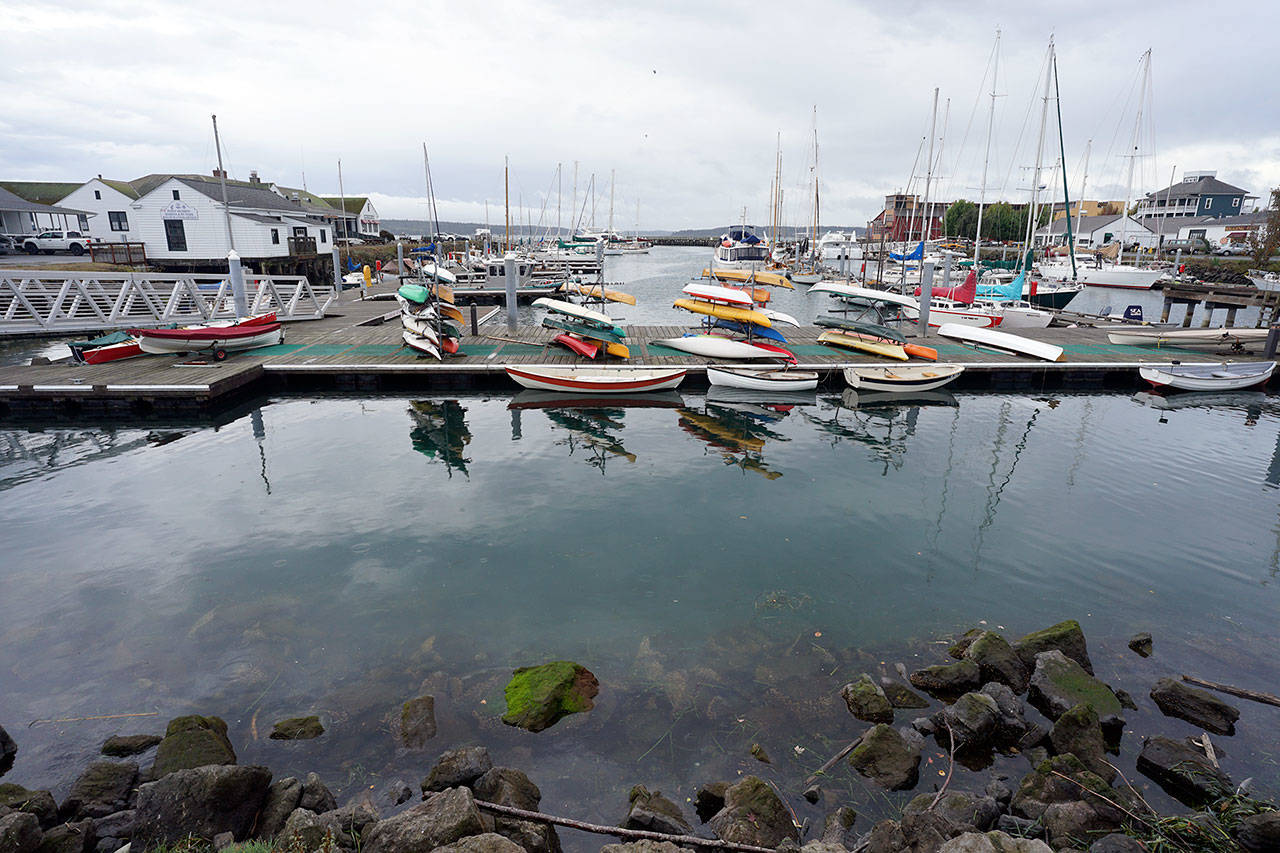PORT TOWNSEND — Port of Port Townsend commissioners got their first taste Wednesday of the Jamestown S’Klallam Tribe’s hope of bringing aquaculture back to Point Hudson in the form of an oyster nursery, an oyster bar and a seafood outlet.
“Harvesting and selling of seafood was once a common occurrence, not just at Point Hudson but all across the North Olympic coast,” said Kyle E. Johnson, executive director of the tribe’s Economic Development Authority. “And we’re hoping to bring that back to Point Hudson.”
The idea, Johnson said, is still very much in the early stages, much like the young Pacific and Kumamoto oysters the tribe is hoping raise in a roughly 20-foot by 80-foot FLUPSY — short for floating upweller system — deep in the northernmost corner of the Point Hudson Marina.
“This is part of our public outreach campaign to educate people about FLUPSYs,” Johnson said, noting he and the team at Jamestown Seafood, a company that manages seafood production as an extension of the tribe, will soon approach the city of Port Townsend to further explore the idea and the public process it will require.
Port commissioners said they already have received a slew of questions, concerns and expressions of support around the proposal.
Chair Pete Hanke said questions and comments will be posted on the port’s website along with responses to promote a transparent process.
“There is no hidden agenda or motivation on the port’s behalf for or against this project,” Hanke said. “There’s still a long ways to go on this proposal.”
The tribe operates a larger FLUPSY array at John Wayne Marina in Sequim. Its oyster seedlings are developed in Kona, Hawaii, then sent to the tribe’s hatchery facility at Point Whitney in Brinnon before graduating to the system in Sequim.
After a couple of months, they’re planted on tribal beaches as well as other private and public tidelands — such as a proposed site at the Dungeness National Wildlife Refuge — where they stay for at least six months before harvesting and consumption, said Ralph Riccio, a marine biologist and salesperson at Jamestown Seafood.
Riccio, who was heavily involved in the permitting process for the Sequim FLUPSY, said he expects a robust environmental review and permitting process involving the city, the port, the state Department of Ecology, the U.S. Army Corps of Engineers, the U.S. Fish and Wildlife Service and the National Oceanic and Atmospheric Administration, among others.
Still, he said he’s confident in the project’s feasibility.
“There’s no amount of oysters that we could put into that body of water that would somehow … have a negative impact as far as the environment is concerned,” he said, noting that, while no chemicals are used, some noise can be expected.
“(In a marina), there’s sound when a haul-out happens, there’s sound when boats start to engine, and there’s sound associated with the activities that happen on the FLUPSY,” he said. “That’s mainly going to be the screener when it’s used during agreed-upon hours, and then an electric pressure washer.”
Kurt Grinnell, president and owner of Jamestown Seafood, said the tribe has no intention of expanding the operation beyond a single FLUPSY, which would be operated by two workers four to five days a week, Riccio added.
“We realize this is a very visible operation, more so than John Wayne, so our FLUPSY staff will have to be very sociable and able to interact with the public,” Johnson said, explaining he’s excited to incorporate educational opportunities in partnership with the Northwest Maritime Center and local schools not only around aquaculture but also the tribal history at Point Hudson, particularly because he’s heard concerns that the project might harm the area’s historic waterfront character.
“It’s really not just white settlers and the white maritime buildings that you see today,” he said. “There were tribal families who lost their homes and were actually pushed over to Point Hudson and lived in tents for a long time. They were able to carry on commerce and carry on with their lives there.”
Johnson said he’d like to incorporate interpretive signage and work with the Wooden Boat Festival to offer canoe-carving demonstrations and maybe even organize a traditional salmon bake on the beach.
The tribe is also eyeing the building that houses Pygmy Boats for an oyster bar with a tribal motif as well as a wholesale seafood outlet, Johnson said.
“Tribal fishers would be able to come and sell their catch, and folks would be able to come and buy it wholesale in addition to having a glass of wine or a cup of chowder or some oyster shooters while looking out over the marina,” he said.
Johnson said he’s also heard concerns about the tribe’s work with Cooke Aquaculture to establish a fish farm in Port Angeles Harbor. He stressed that the tribe is not pursuing any fish farms in Port Townsend, that “not all fish farms are created equal” and that the tribe would not work with Cooke unless it were confident Cooke would “do the right thing.
“Port Townsend is a very socially and environmentally conscious community, and so is the tribe,” he said, “and so I think our values really align.”
________
Jefferson County senior reporter Nicholas Johnson can be reached by phone at 360-417-3509 or by email at njohnson@peninsuladailynews.com.

